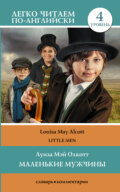
Луиза Мэй Олкотт
Rose in Bloom
Rose said nothing, but, under cover of her burnous, gave Archie's hand a sympathetic squeeze; for his arms were unfolded now, as if the strain was over, and one lay on his knee, while with the other he wiped his hot forehead with an air of relief.
Friends about them murmured complimentary fibs, and affected great delight and surprise at Miss Moore's "charming style," "exquisite simplicity," and "undoubted talent." But strangers freely criticised, and Rose was so indignant at some of their remarks she could not listen to any thing upon the stage, though a fine overture was played, a man with a remarkable bass voice growled and roared melodiously, and the orphans sang a lively air with a chorus of "Tra, la, la," which was a great relief to little tongues unused to long silence.
"I've often heard that women's tongues were hung in the middle and went at both ends: now I'm sure of it," whispered Charlie, trying to cheer her up by pointing out the comical effect of some seventy-five open mouths, in each of which the unruly member was wagging briskly.
Rose laughed and let him fan her, leaning from his seat behind with the devoted air he always assumed in public; but her wounded feelings were not soothed, and she continued to frown at the stout man on the left, who had dared to say with a shrug and a glance at Phebe's next piece, "That young woman can no more sing this Italian thing than she can fly, and they ought not to let her attempt it."
Phebe did, however; and suddenly changed the stout man's opinion by singing it grandly; for the consciousness of her first failure pricked her pride and spurred her to do her best with the calm sort of determination which conquers fear, fires ambition, and changes defeat to success. She looked steadily at Rose now, or the flushed, intent face beside her; and throwing all her soul into the task let her voice ring out like a silver clarion, filling the great hall and setting the hearers' blood a-tingle with the exulting strain.
That settled Phebe's fate as cantatrice; for the applause was genuine and spontaneous this time, and broke out again and again with the generous desire to atone for former coldness. But she would not return, and the shadow of the great organ seemed to have swallowed her up; for no eye could find her, no pleasant clamor win her back.
"Now I can die content," said Rose, beaming with heart-felt satisfaction; while Archie looked steadfastly at his programme, trying to keep his face in order, and the rest of the family assumed a triumphant air, as if they had never doubted from the first.
"Very well, indeed," said the stout man, with an approving nod. "Quite promising for a beginner. Shouldn't wonder if in time they made a second Cary or Kellogg of her."
"Now you'll forgive him, won't you?" murmured Charlie, in his cousin's ear.
"Yes; and I'd like to pat him on the head. But take warning and never judge by first appearances again," whispered Rose, at peace now with all mankind.
Phebe's last song was another ballad; for she meant to devote her talent to that much neglected but always attractive branch of her art. It was a great surprise, therefore, to all but one person in the hall, when, instead of singing "Auld Robin Grey," she placed herself at the piano, and, with a smiling glance over her shoulder at the children, broke out in the old bird-song which first won Rose. But the chirping, twittering, and cooing were now the burden to three verses of a charming little song, full of spring-time and the awakening life that makes it lovely. A rippling accompaniment flowed through it all, and a burst of delighted laughter from the children filled up the first pause with a fitting answer to the voices that seemed calling to them from the vernal woods.
It was very beautiful, and novelty lent its charm to the surprise; for art and nature worked a pretty miracle, and the clever imitation, first heard from a kitchen hearth, now became the favorite in a crowded concert room. Phebe was quite herself again; color in the cheeks now; eyes that wandered smiling to and fro; and lips that sang as gaily and far more sweetly than when she kept time to her blithe music with a scrubbing brush.
This song was evidently intended for the children, and they appreciated the kindly thought; for, as Phebe went back among them, they clapped ecstatically, flapped their pinafores, and some caught her by the skirts with audible requests to "do it again, please; do it again."
But Phebe shook her head and vanished; for it was getting late for such small people, several of whom "lay sweetly slumbering there," till roused by the clamor round them. The elders, however, were not to be denied, and applauded persistently, especially Aunt Plenty, who seized Uncle Mac's cane and pounded with it as vigorously as "Mrs. Nubbles" at the play.
"Never mind your gloves, Steve; keep it up till she comes," cried Charlie, enjoying the fun like a boy; while Jamie lost his head with excitement, and standing up called "Phebe! Phebe!" in spite of his mother's attempts to silence him.
Even the stout man clapped, and Rose could only laugh delightedly as she turned to look at Archie, who seemed to have let himself loose at last, and was stamping with a dogged energy funny to see.
So Phebe had to come, and stood there meekly bowing, with a moved look on her face, that showed how glad and grateful she was, till a sudden hush came; then, as if inspired by the memory of the cause that brought her there, she looked down into the sea of friendly faces before her, with no trace of fear in her own, and sung the song that never will grow old.
That went straight to the hearts of those who heard her: for there was something inexpressibly touching in the sight of this sweet-voiced woman singing of home for the little creatures who were homeless; and Phebe made her tuneful plea irresistible by an almost involuntary gesture of the hands which had hung loosely clasped before her; till, with the last echo of the beloved word, they fell apart and were half-out-stretched as if pleading to be filled.
It was the touch of nature that works wonders; for it made full purses suddenly weigh heavily in pockets slow to open, brought tears to eyes unused to weep, and caused that group of red-gowned girls to grow very pathetic in the sight of fathers and mothers who had left little daughters safe asleep at home. This was evident from the stillness that remained unbroken for an instant after Phebe ended; and before people could get rid of their handkerchiefs she would have been gone, if the sudden appearance of a mite in a pinafore, climbing up the stairs from the anteroom, with a great bouquet grasped in both hands, had not arrested her.
Up came the little creature, intent on performing the mission for which rich bribes of sugar-plums had been promised, and trotting bravely across the stage, she held up the lovely nosegay, saying in her baby voice, "Dis for you, ma'am;" then, startled by the sudden outburst of applause, she hid her face in Phebe's gown, and began to sob with fright.
An awkward minute for poor Phebe; but she showed unexpected presence of mind, and left behind her a pretty picture of the oldest and the youngest orphan, as she went quickly down the step, smiling over the great bouquet with the baby on her arm.
Nobody minded the closing piece; for people began to go, sleepy children to be carried off, and whispers grew into a buzz of conversation. In the general confusion, Rose looked to see if Steve had remembered his promise to help Phebe slip away before the rush began. No, there he was putting on Kitty's cloak, quite oblivious of any other duty; and, fuming to ask Archie to hurry out, Rose found that he had already vanished, leaving his gloves behind him.
"Have you lost any thing?" asked Dr. Alec, catching a glimpse of her face.
"No, sir, I've found something," she whispered back, giving him the gloves to pocket along with her fan and glass, adding hastily as the concert ended, "Please, uncle, tell them all not to come with us. Phebe has had enough excitement, and ought to rest."
Rose's word was law to the family in all things concerning Phebe. So word was passed that there were to be no congratulations till to-morrow, and Dr. Alec got his party off as soon as possible. But all the way home, while he and Aunt Plenty were prophesying a brilliant future for the singer, Rose sat rejoicing over the happy present of the woman. She was sure that Archie had spoken, and imagined the whole scene with feminine delight, – how tenderly he had asked the momentous question, how gratefully Phebe had given the desired reply, and now how both were enjoying that delicious hour which Rose had been given to understand never came but once. Such a pity to shorten it, she thought; and begged her uncle to go home the longest way: the night was so mild, the moonlight so clear, and herself so in need of fresh air after the excitement of the evening.
"I thought you would want to rush into Phebe's arms the instant she got done," said Aunt Plenty, innocently wondering at the whims girls took into their heads.
"So I should if I consulted my own wishes; but as Phebe asked to be let alone I want to gratify her," answered Rose, making the best excuse she could.
"A little piqued," thought the doctor, fancying he understood the case.
As the old lady's rheumatism forbade their driving about till midnight, home was reached much too soon, Rose thought, and tripped away to warn the lovers the instant she entered the house. But study, parlor, and boudoir were empty; and, when Jane appeared with cake and wine, she reported that "Miss Phebe went right upstairs, and wished to be excused, please, being very tired."
"That isn't at all like Phebe: I hope she isn't ill," began Aunt Plenty, sitting down to toast her feet.
"She may be a little hysterical; for she is a proud thing, and represses her emotions as long as she can. I'll step up and see if she doesn't need a soothing draught of some sort," and Dr. Alec threw off his coat as he spoke.
"No, no, she's only tired. I'll run up to her: she won't mind me; and I'll report if any thing is amiss."
Away went Rose, quite trembling with suspense; but Phebe's door was shut, no light shone underneath, and no sound came from the room within. She tapped, and, receiving no answer, went on to her own chamber, thinking to herself, —
"Love always makes people queer, I've heard; so I suppose they settled it all in the carriage, and the dear thing ran away to think about her happiness alone. I'll not disturb her. Why, Phebe!" added Rose, surprised; for, entering her room, there was the cantatrice, busy about the nightly services she always rendered her little mistress.
"I'm waiting for you, dear. Where have you been so long?" asked Phebe, poking the fire as if anxious to get some color into cheeks that were unnaturally pale.
The instant she spoke, Rose knew that something was wrong, and a glance at her face confirmed the fear. It was like a dash of cold water, and quenched her happy fancies in a moment; but being a delicate-minded girl she respected Phebe's mood, and asked no questions, made no comments, and left her friend to speak or be silent as she chose.
"I was so excited I would take a turn in the moonlight to calm my nerves. O dearest Phebe, I am so glad, so proud, so full of wonder at your courage and skill and sweet ways altogether, that I cannot half tell you how I love and honor you!" she cried, kissing the white cheeks with such tender warmth they could not help glowing faintly, as Phebe held her little mistress close, sure that nothing could disturb this innocent affection.
"It is all your work, dear; because but for you I might still be scrubbing floors, and hardly dare to dream of any thing like this," she said, in her old grateful way; but in her voice there was a thrill of something deeper than gratitude, and at the last two words her head went up with a gesture of soft pride as if it had been newly crowned.
Rose heard and saw and guessed the meaning of both tone and gesture; feeling that her Phebe deserved both the singer's laurel and the bride's myrtle wreath. But she only looked up, saying very wistfully, —
"Then it has been a happy night for you as well as for us."
"The happiest of my life, and the hardest," answered Phebe briefly, as she looked away from the questioning eyes.
"You should have let us come nearer and help you through. I'm afraid you are very proud, my Jenny Lind."
"I have to be; for sometimes I feel as if I had nothing else to keep me up." She stopped short there, fearing that her voice would prove traitorous if she went on. In a moment, she asked in a tone that was almost hard, —
"You think I did well to-night?"
"They all think so, and were so delighted they wanted to come in a body and tell you so; but I sent them home, because I knew you'd be tired out. Perhaps I ought not to have done it, and you'd rather have had a crowd about you than just me?"
"It was the kindest thing you ever did, and what could I like better than 'just you,' my darling?"
Phebe seldom called her that, and when she did her heart was in the little word, making it so tender that Rose thought it the sweetest in the world, next to Uncle Alec's "my little girl." Now it was almost passionate, and Phebe's face grew rather tragical as she looked down at Rose. It was impossible to seem unconscious any longer, and Rose said, caressing Phebe's cheek, which burned with a feverish color now, —
"Then don't shut me out if you have a trouble; but let me share it as I let you share all mine."
"I will! Little mistress, I've got to go away, sooner even than we planned."
"Why, Phebe?"
"Because – Archie loves me."
"That's the very reason you should stay and make him happy."
"Not if it caused dissension in the family, and you know it would."
Rose opened her lips to deny this impetuously, but checked herself and answered honestly, —
"Uncle and I would be heartily glad; and I'm sure Aunt Jessie never could object, if you loved Archie as he does you."
"She has other hopes, I think; and kind as she is it would be a disappointment if he brought me home. She is right; they all are, and I alone am to blame. I should have gone long ago: I knew I should; but it was so pleasant I couldn't bear to go away alone."
"I kept you, and I am to blame if any one; but indeed, dear Phebe, I cannot see why you should care even if Aunt Myra croaks, and Aunt Clara exclaims, or Aunt Jane makes disagreeable remarks. Be happy, and never mind them," cried Rose; so much excited by all this that she felt the spirit of revolt rise up within her, and was ready to defy even that awe-inspiring institution "the family" for her friend's sake.
But Phebe shook her head with a sad smile; and answered, still with the hard tone in her voice as if forcing back all emotion that she might see her duty clearly, —
"You could do that, but I never can. Answer me this, Rose, and answer truly as you love me. If you had been taken into a house, a friendless, penniless, forlorn girl, and for years been heaped with benefits, trusted, taught, loved, and made, oh, so happy! could you think it right to steal away something that these good people valued very much? To have them feel that you had been ungrateful, had deceived them, and meant to thrust yourself into a high place not fit for you; when they had been generously helping you in other ways, far more than you deserved. Could you then say as you do now, 'Be happy and never mind them'?"
Phebe held Rose by the shoulders now, and searched her face so keenly that the other shrunk a little; for the black eyes were full of fire, and there was something almost grand about this girl who seemed suddenly to have become a woman. There was no need of words to answer the questions so swiftly asked; for Rose put herself in Phebe's place in the drawing of a breath, and her own pride made her truthfully reply, —
"No: I could not!"
"I knew you'd say that, and help me do my duty;" and all the coldness melted out of Phebe's manner, as she hugged her little mistress close, feeling the comfort of sympathy even through the blunt sincerity of Rose's words.
"I will if I know how. Now come and tell me all about it;" and, seating herself in the great chair which had often held them both, Rose stretched out her hands as if glad and ready to give help of any sort.
But Phebe would not take her accustomed place; for, as if coming to confession, she knelt down upon the rug, and, leaning on the arm of the chair, told her love-story in the simplest words.
"I never thought he cared for me until a little while ago. I fancied it was you, and even when I knew he liked to hear me sing I supposed it was because you helped; and so I did my best, and was glad you were to be a happy girl. But his eyes told the truth; then I saw what I had been doing, and was frightened. He did not speak; so I believed, what is quite true, that he felt I was not a fit wife for him, and would never ask me. It was right: I was glad of it, yet I was proud; and, though I did not ask or hope for any thing, I did want him to see that I respected myself, remembered my duty, and could do right as well as he. I kept away; I planned to go as soon as possible, and resolved that at this concert I would do so well he should not be ashamed of poor Phebe and her one gift."
"It was this that made you so strange, then; preferring to go alone, and refusing every little favor at our hands?" asked Rose, feeling very sure now about the state of Phebe's heart.
"Yes; I wanted to do every thing myself, and not owe one jot of my success, if I had any, to even the dearest friend I've got. It was bad and foolish of me, and I was punished by that first dreadful failure. I was so frightened, Rose! My breath was all gone, my eyes so dizzy I could hardly see, and that great crowd of faces seemed so near I dared not look. If it had not been for the clock, I never should have got through; and when I did, not knowing in the least how I'd sung, one look at your distressed face told me that I'd failed."
"But I smiled, Phebe, – indeed I did, – as sweetly as I could; for I was sure it was only fright," protested Rose, eagerly.
"So you did: but the smile was full of pity, not of pride, as I wanted it to be; and I rushed into a dark place behind the organ, feeling ready to kill myself. How angry and miserable I was! I set my teeth, clenched my hands, and vowed that I would do well next time, or never sing another note. I was quite desperate when my turn came, and felt as if I could do almost any thing; for I remembered that he was there. I'm not sure how it was, but it seemed as if I was all voice; for I let myself go, trying to forget every thing except that two people must not be disappointed, though I died when the song was done."
"O Phebe, it was splendid! I nearly cried, I was so proud and glad to see you do yourself justice at last."
"And he?" whispered Phebe, with her face half hidden on the arm of the chair.
"Said not a word: but I saw his lips tremble and his eyes shine; and I knew he was the happiest creature there, because I was sure he did think you fit to be his wife, and did mean to speak very soon."
Phebe made no answer for a moment, seeming to forget the small success in the greater one which followed, and to comfort her sore heart with the knowledge that Rose was right.
"He sent the flowers; he came for me, and, on the way home, showed me how wrong I had been to doubt him for an hour. Don't ask me to tell that part, but be sure I was the happiest creature in the world then." And Phebe hid her face again, all wet with tender tears, that fell soft and sudden as a summer shower.
Rose let them flow undisturbed, while she silently caressed the bent head; wondering, with a wistful look in her own wet eyes, what this mysterious passion was, which could so move, ennoble, and beautify the beings whom it blessed.
An impertinent little clock upon the chimney-piece striking eleven broke the silence, and reminded Phebe that she could not indulge in love-dreams there. She started up, brushed off her tears, and said resolutely, —
"That is enough for to-night. Go happily to bed, and leave the troubles for to-morrow."
"But, Phebe, I must know what you said," cried Rose, like a child defrauded of half its bedtime story.
"I said 'No.'"
"Ah! but it will change to 'Yes' by and by; I'm sure of that: so I'll let you go to dream of 'him.' The Campbells are rather proud of being descendants of Robert Bruce; but they have common-sense and love you dearly, as you'll see to-morrow."
"Perhaps." And, with a good-night kiss, poor Phebe went away, to lie awake till dawn.






